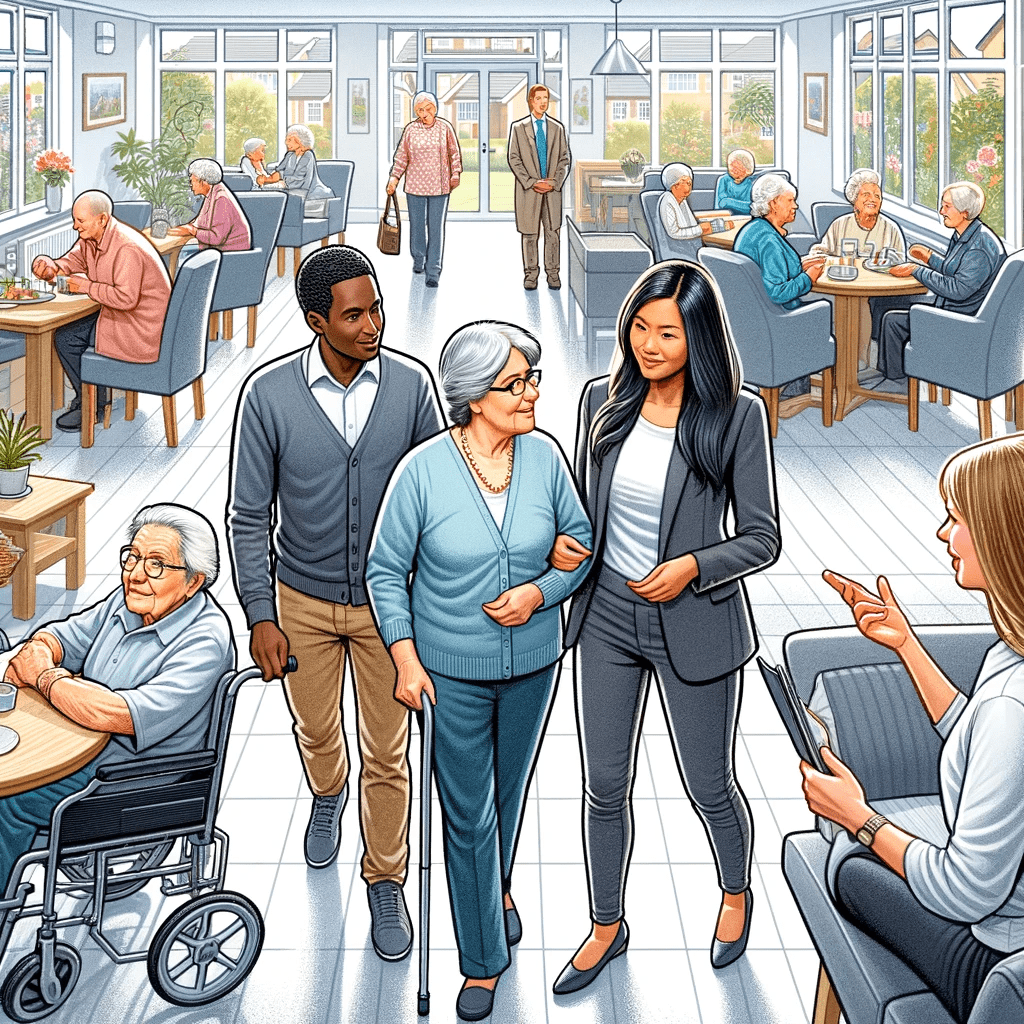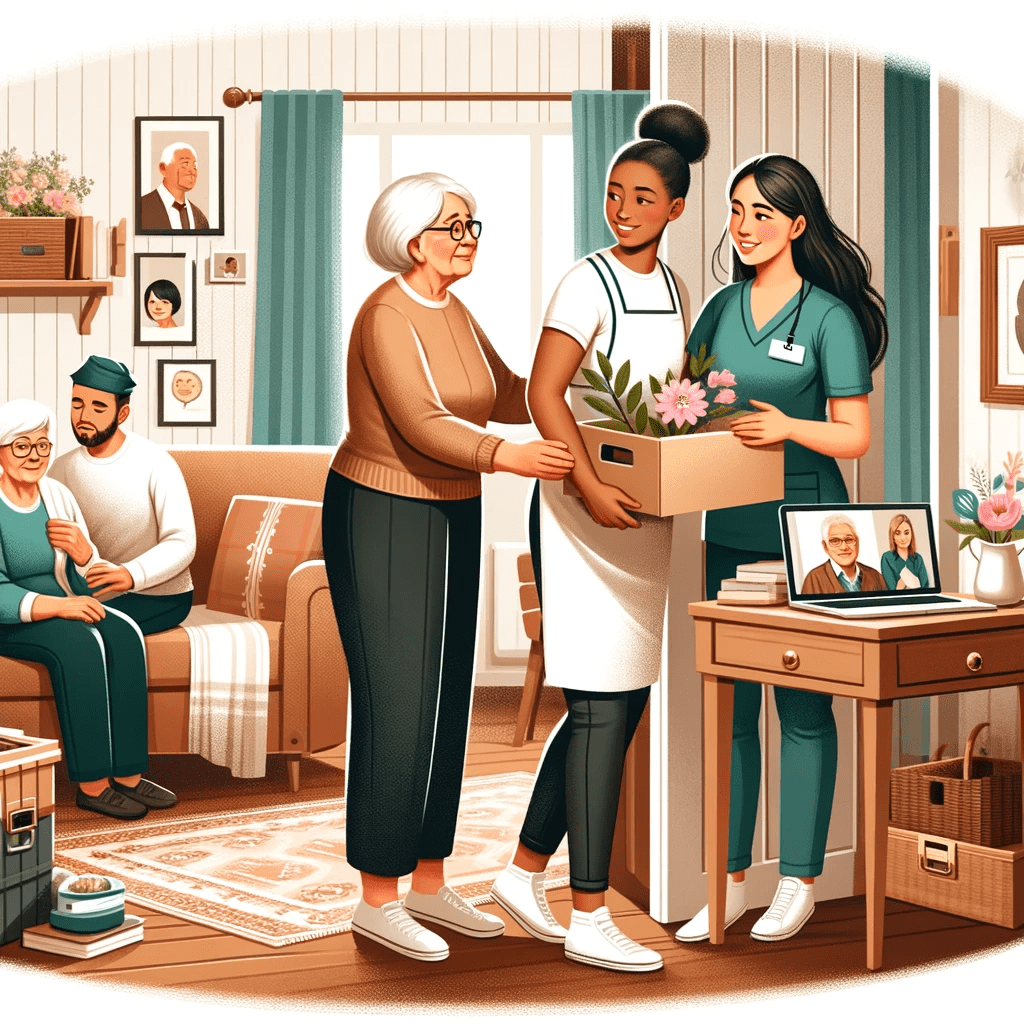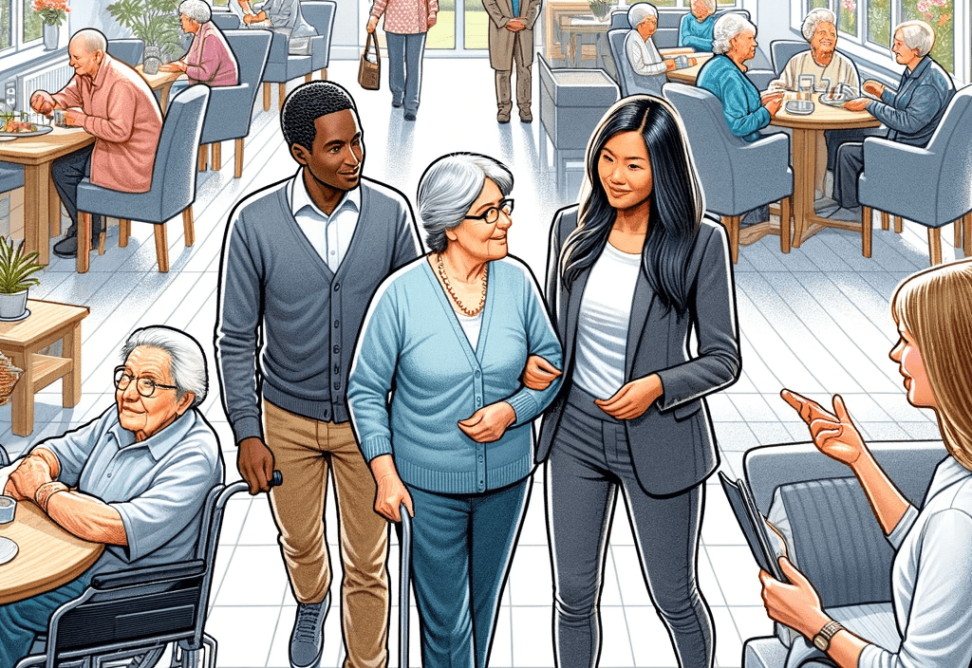Introduction to Residential Care Homes Definition and Overview Residential care homes provide a vital service for those who require assistance with daily living but do not need the intensive medical care provided by nursing homes. These facilities offer a combination…
ReadPurpose of the Guide
This guide is designed to serve as an essential resource for individuals and families in the United Kingdom navigating the complex world of care homes. The transition to a care home, whether for oneself or a loved one, can be a significant life event, filled with many questions and decisions. Our aim is to provide comprehensive, clear, and practical information to help in making informed choices about care homes. By shedding light on various aspects of care homes, from understanding the types available to the intricacies of choosing the right one, this guide seeks to demystify the process and offer support every step of the way.
Overview of Care Homes
In the UK, care homes play a crucial role in the healthcare system, providing accommodation and personal care for people who may not be able to live independently or who require constant care. These facilities cater to a diverse range of needs, from older adults and those with disabilities to individuals with chronic illnesses or recuperating from medical procedures.
Care homes in the UK are broadly categorised into two types: residential care homes and nursing homes. Residential care homes offer a safe, communal living environment with professional staff available to assist with daily activities, such as washing, dressing, and eating. Nursing homes, on the other hand, provide all the support of a residential care home with the added presence of qualified nurses, offering medical care for residents with more complex health needs.
Understanding the role and function of care homes is the first step in appreciating their importance in supporting the health and wellbeing of many individuals in our society. This guide will walk you through the various aspects of care homes, offering insights and advice to help you or your loved one find the most suitable care environment.

Understanding Care Homes
Types of Care Homes
In the UK, care homes are tailored to meet various needs, ensuring that each individual receives the appropriate level of care and support. The main types of care homes include:
- Residential Care Homes: These facilities provide personal care, such as help with washing, dressing, and taking medication. They are ideal for individuals who are mostly independent but require some assistance with daily activities.
- Nursing Homes: Nursing homes offer all the support of residential care plus medical care from qualified nurses. This option is suitable for people with significant health needs, requiring regular medical attention.
- Specialist Dementia Care Homes: Designed specifically for individuals with dementia, these homes provide a safe and supportive environment with staff trained in dementia care.
- Dual-Registered Homes: These homes cater to residents who need both personal and nursing care, allowing them to remain in the same place even if their needs change over time.
Services Provided
Care homes in the UK offer a wide range of services to ensure the health and wellbeing of their residents:
- Medical Care: Regular health checks, medication management, and access to medical professionals.
- Physical Therapy: Services for residents needing rehabilitation or with mobility issues.
- Personal Care: Assistance with everyday tasks like bathing, dressing, and eating.
- Social and Recreational Activities: Organised events and activities to encourage socialisation and mental stimulation.
- Nutritional Support: Tailored meal plans and dietary management to cater to individual nutritional needs.
- 24-hour Support: Round-the-clock care and assistance, ensuring residents are always cared for.
Regulations and Standards
Care homes in the UK are regulated to ensure they provide safe, effective, compassionate, and high-quality care. The key regulatory bodies include:
Care Quality Commission (CQC) in England: They inspect care homes and rate them on how well they provide care, treating residents with respect, and managing their operations.
Care Inspectorate Wales (CIW): They regulate and inspect social care and social services in Wales to provide independent assurance about the quality and availability of these services.
The Regulation and Quality Improvement Authority (RQIA) in Northern Ireland: They monitor and inspect the availability and quality of health and social care services.
Care Inspectorate in Scotland: They regulate and inspect care services to ensure they meet the right standards.
These bodies set standards that care homes must meet, covering aspects like safety, staffing, management, and the quality of care. Regular inspections are conducted, and the results are made public, helping individuals make informed decisions when choosing a care home. Compliance with these regulations ensures that care homes not only meet the physical and medical needs of their residents but also uphold their dignity and rights.
Assessing the Need for a Care Home
Signs and Indicators
Recognising when it may be time to consider a care home is crucial for the wellbeing of the individual. Some key signs and indicators include:
- Increasing Care Needs: Difficulty managing daily tasks such as bathing, dressing, or eating independently.
- Safety Concerns: Frequent falls, accidents, or near misses at home.
- Health Deterioration: Worsening chronic conditions or new health issues that require regular medical attention.
- Cognitive Decline: Noticeable changes in memory, reasoning, or behavior, particularly in cases of dementia or Alzheimer’s disease.
- Isolation and Loneliness: Decreased social interaction, which can impact mental health.
- Caregiver Stress: When the demands of care become too challenging for family caregivers.
Consulting with Healthcare Professionals
Seeking professional advice is vital in making an informed decision about moving to a care home. Steps include:
- Discuss with a GP: Your General Practitioner can provide an initial assessment and advice based on the individual’s health and care needs.
- Specialist Consultations: For specific conditions like dementia, consulting with specialists can offer more detailed insights.
- Care Needs Assessment: In the UK, local authorities provide free care needs assessments, which can help determine the level of care required and eligibility for support.
Involving the Family
Family involvement is critical in the decision-making process:
- Open Communication: Encourage discussions about care options, preferences, and concerns.
- Joint Visits to Care Homes: Involve family members in visiting potential care homes to assess suitability.
- Legal and Financial Planning: Engage in planning for legal matters (like power of attorney) and financial implications of care home living.
Making the decision to transition to a care home is significant, and should be approached with careful consideration of the individual’s needs and preferences, as well as input from healthcare professionals and family members.
Choosing the Right Care Home
Location and Accessibility
Selecting a care home that is conveniently located is important for several reasons:
- Proximity to Family and Friends: A location close to loved ones makes it easier for regular visits, maintaining strong family ties.
- Access to Community and Services: Consider if the home is near essential services, like shops, parks, or healthcare facilities.
- Transport Links: Good public transport links can be important for visitors who don’t drive.
Evaluating Facilities and Services
Assessing the quality of facilities and services is crucial:
- Accommodation: Check if the living spaces are comfortable, well-maintained, and suit your needs.
- Health and Personal Care: Evaluate the quality and range of healthcare and personal care services provided.
- Activities and Social Life: Look for a vibrant social calendar that caters to a range of interests.
- Food Quality: Consider the quality and variety of food, and whether dietary needs are catered for.
The UK Government provides guidelines on choosing a care home, which can be a valuable resource: Choosing a care home – GOV.UK.
Staff Qualifications and Training
The qualifications and training of the staff are indicative of the care quality:
- Professional Credentials: Ensure that nurses and carers are properly qualified.
- Ongoing Training: Look for homes that provide regular training to their staff.
- Staff-to-Resident Ratio: This affects the amount of individual attention residents can receive.
Resident Rights and Safety
Understanding and ensuring residents’ rights and safety is paramount:
- Resident Rights: Familiarise yourself with the rights of residents in care homes.
- Safety Measures: Check for the presence of comprehensive safety measures, including emergency procedures and equipment.
The Care Quality Commission (CQC) provides insights into safety standards and resident rights in care homes: CQC.
Financial Considerations
Discussing and planning for the financial aspects is essential:
- Cost of Care: Understand the full cost of care and what it includes.
- Funding Options: Explore funding options like local authority support, NHS funding, or private insurance.
- Financial Planning: Consider speaking with a financial advisor for long-term planning.
Age UK offers guidance on care home costs and funding: Paying for permanent residential care – Age UK.
Choosing the right care home involves a careful balance of practical, financial, and emotional considerations. It’s about finding a place where the resident will feel comfortable, safe, and well-cared for.

Visiting Potential Care Homes
What to Look For
When visiting potential care homes, observing certain key factors can provide valuable insights:
- First Impressions: Note the cleanliness, maintenance, and overall atmosphere of the home.
- Interactions: Observe how staff interact with residents. Are they respectful, patient, and attentive?
- Residents: Look at the residents themselves. Do they appear well-cared for, engaged, and happy?
- Safety and Security: Assess the safety features of the home, such as grab rails, security systems, and emergency procedures.
- Outdoor Spaces: Check if there are accessible gardens or outdoor areas for residents to enjoy.
Questions to Ask
Asking the right questions can reveal a lot about a care home:
- Staffing: What is the staff-to-resident ratio? What qualifications do the staff have?
- Care Plans: How are individual care plans developed and reviewed?
- Activities and Engagement: What types of activities are offered? How are residents encouraged to participate?
- Meals and Nutrition: What meal options are available? How are dietary needs accommodated?
- Visiting Policies: What are the home’s policies on visitors?
- Fees and Additional Costs: What is included in the fees, and what are considered extra costs?
Observing Resident Care and Interaction
The quality of care and the social environment are critical:
- Resident Interaction: Watch how residents interact with each other and with staff. Are they engaged and sociable?
- Personal Care: Observe instances of personal care being given. Is it done with dignity and respect?
- Response to Needs: Notice how staff respond to residents’ requests or needs. Is the response timely and appropriate?
- Activity Engagement: Look at ongoing activities. Are residents enjoying themselves, and are activities well-attended?
Visiting potential care homes provides an opportunity to assess whether they meet the needs and preferences of the individual considering the move. It’s also a chance to get a feel for the daily life and culture of the home, which is just as important as the practical considerations.

Legal and Ethical Considerations
Power of Attorney and Guardianship
Understanding the legal aspects of decision-making is crucial when moving to a care home:
- Power of Attorney (POA): This legal document allows an individual (the donor) to appoint one or more people (attorneys) to make decisions on their behalf. In the UK, there are two types: Health and Welfare POA, which covers health and care decisions, and Property and Financial Affairs POA.
- Guardianship: In cases where an individual cannot make decisions for themselves and hasn’t set up a POA, the court can appoint a guardian to make decisions about personal welfare or property.
Information about setting up a Power of Attorney can be found on the UK Government website: Make, register or end a lasting power of attorney – GOV.UK.
Residents’ Rights and Advocacy
Residents in care homes have specific rights that must be upheld:
- Respect and Dignity: Every resident has the right to be treated with respect and dignity.
- Personal Choice and Independence: Residents should have the choice and independence to make decisions about their daily life.
- Safety and Security: The right to a safe and secure living environment.
- Confidentiality: Personal information must be kept confidential.
Advocacy services play a vital role in ensuring these rights are respected. They can provide support in voicing concerns or making complaints.
Ethical Considerations
Ethical dilemmas in care homes can arise in various situations:
- End-of-Life Decisions: Decisions around life-sustaining treatments and palliative care.
- Consent for Treatment: Addressing issues when a resident is unable to give consent.
- Balancing Individual Needs and Resources: Ensuring fair allocation of resources while addressing individual needs.
These considerations require careful, compassionate handling, often involving discussions with family members, healthcare professionals, and legal advisors. It is important for care homes to have clear policies and trained staff to navigate these complex situations ethically and legally.

Transitioning to a Care Home
Preparing for the Move
A smooth transition to a care home is essential for the comfort and adjustment of the new resident. Here are some practical tips:
- Downsizing and Personal Belongings: Sort through personal items and decide what to take. Familiar objects can help ease the transition.
- Understanding the New Routine: Learn about the daily schedule in the care home to set realistic expectations.
- Addressing Healthcare Needs: Ensure that all medical information and medication are organised and ready to be handed over to the care home staff.
Emotional Support and Counseling
Transitioning to a care home can be emotionally challenging. Providing emotional support is key:
- Open Discussions: Encourage conversations about feelings and concerns related to the move.
- Professional Support: Consider seeking support from counselors or therapists who specialise in elder care transitions.
- Peer Support: Look for opportunities in the care home where the resident can interact with other residents who have gone through similar experiences.
Maintaining Family and Community Connections
Keeping residents connected with their family and community is important for their mental and emotional well-being:
- Regular Visits: Plan frequent visits to the care home by family and friends.
- Technology Use: Utilise technology, like video calls, to maintain regular contact.
- Community Involvement: Encourage participation in community events or activities, if possible.
These steps can help ensure that the transition to a care home is as smooth and positive as possible, both practically and emotionally, for the new resident and their loved ones.

Living in a Care Home
Daily Life and Activities
Life in a care home includes a structured daily routine with various activities:
- Routine: Regular meal times, medication schedules, and personal care routines provide stability and consistency.
- Recreational Activities: A range of activities, from arts and crafts to music sessions and exercise classes, cater to different interests and abilities.
- Social Interaction: Opportunities for socialising, such as group activities, communal dining, and special events.
Healthcare and Personal Care
Ongoing healthcare and personal care are central to life in a care home:
- Medical Care: Regular health checks, medication management, and access to medical professionals as needed.
- Personal Care: Assistance with daily living activities, like bathing, dressing, and grooming, tailored to each resident’s needs.
- Specialised Care: For residents with specific conditions, such as dementia, care homes provide specialised care and support.
Family Visits and Involvement
Family involvement is a key aspect of life in a care home:
- Visiting: Families are encouraged to visit regularly. Many care homes have flexible visiting hours to accommodate different schedules.
- Involvement in Care: Families can be involved in care planning and decision-making, ensuring that the resident’s preferences and needs are respected.
- Staying Connected: Care homes often facilitate various ways for residents to stay connected with their families, whether through regular visits, phone calls, or video chats.
Living in a care home can offer residents a fulfilling, active, and supported lifestyle, with a focus on maintaining their health, well-being, and personal connections.

Resolving Issues and Complaints
Feedback Mechanisms
Effective feedback mechanisms are essential in care homes to ensure continuous improvement and resident satisfaction:
- Regular Meetings: Many care homes hold regular meetings with residents and families to discuss concerns and feedback.
- Suggestion Boxes: A confidential way for residents and families to submit feedback or concerns.
- Direct Communication: Encouraging open communication with staff and management for immediate concerns or feedback.
Conflict Resolution
Strategies for resolving disputes and misunderstandings include:
- Mediation: Involving a neutral third party to help resolve disputes can be effective, especially for more complex issues.
- Open Dialogue: Encouraging open and honest conversations between all parties involved to understand different perspectives.
- Action Plans: Developing clear action plans to address the concerns raised and following up to ensure these actions are implemented.
Regulatory and Legal Recourse
Understanding the role of regulatory bodies and legal options is important:
- Care Quality Commission (CQC): In England, the CQC can be contacted for serious concerns about care homes. They do not settle individual complaints but ensure standards are met.
- Local Authorities: Local authorities can be a point of contact for complaints, especially if they fund the resident’s care.
- Legal Advice: In cases where issues are not resolved, seeking legal advice may be necessary.
Information on how to make a complaint about a care home in England can be found on the CQC website: How to complain about a care home – CQC.
Handling issues and complaints effectively is crucial in maintaining trust and ensuring the well-being of residents in care homes. It’s important that residents and their families feel heard and that their concerns are addressed promptly and effectively.
Resources and Support
Helpful Organisations and Websites
There are numerous organisations and websites that provide valuable support and information for those living in or considering care homes:
- Age UK: Offers comprehensive information on care homes, including advice on choosing and paying for a care home. Website: Age UK
- NHS Choices: Provides guidance on care services and health-related information. Website: NHS Choices
- Alzheimer’s Society: A resource for those affected by dementia, offering support and advice. Website: Alzheimer’s Society
- Independent Age: Gives advice on care and support for older people. Website: Independent Age
- Citizens Advice: Offers practical, impartial information on a range of issues including legal and financial aspects of care homes. Website: Citizens Advice
Community Programs and Services
Community resources and services can greatly enhance the quality of life for care home residents:
- Local Day Centers: Offer activities and social opportunities for older adults.
- Volunteer Services: Various organisations provide volunteer services like companionship visits and activity coordination.
- Support Groups: For both residents and their families, these groups offer a space to share experiences and advice.
- Local Libraries and Cultural Institutions: Often have programs and events tailored to seniors.
These resources and community programs play a vital role in supporting the physical, emotional, and social well-being of individuals in care homes. They also provide essential information and guidance for families and caregivers, helping them make informed decisions and maintain a supportive environment for their loved ones.
Conclusion
Summary and Final Thoughts
This guide has aimed to provide a comprehensive overview of the journey into and through care home living in the UK. Key points covered include:
- Understanding Care Homes: Recognising the different types of care homes and the services they offer.
- Assessing the Need: Identifying when it might be time to consider a care home and how to involve healthcare professionals and family in this decision.
- Choosing the Right Care Home: Factors to consider include location, facilities, staff qualifications, resident rights, and financial considerations.
- Visiting Potential Homes: The importance of observing, asking questions, and assessing the quality of care and interaction during visits.
- Legal and Ethical Considerations: Understanding the implications of power of attorney, guardianship, residents’ rights, and ethical dilemmas.
- Transitioning to a Care Home: Preparing for the move, providing emotional support, and maintaining family and community connections.
- Living in a Care Home: Insight into daily life, healthcare, personal care, and the importance of family visits and involvement.
- Resolving Issues and Complaints: Mechanisms for feedback, conflict resolution, and understanding regulatory and legal recourse.
- Resources and Support: A directory of helpful organisations, websites, and community programs.
As you navigate the world of care homes, remember that this journey is about finding a place where you or your loved one will feel comfortable, respected, and cared for. It’s about balancing practical needs with emotional well-being and ensuring that the chosen care home provides a supportive and enriching environment.
We hope this guide serves as a valuable resource in your search for the right care home, offering peace of mind that your choice will contribute positively to the well-being and happiness of you or your loved one.




